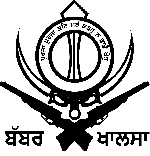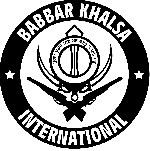Babbar Khalsa
The Babbar Khalsa is the oldest and most prominent Sikh freedom fighting organisation and is one of many Sikh groups operating for the formation of an independent Sikh state called Khalistan (meaning Land of the Pure) from Indian territory in the Punjab, Haryana, Himachal Pradesh and Rajasthan. Like other Sikh freedom fighting organisations, the Babbar Khalsa was most active in the 1970s and 1980s, although sporadic events are still attributed to it. It is sponsored by expatriate Sikhs, particularly in the United Kingdom and Canada as well as Sikh groups within India.
The Babbar Khalsa traces its origin to the Babbar Akali Movement of 1920, which agitated against British colonial rule in India. The conception of Babbar Khalsa in its modern day form is widely believed to have been brought about as a result of the Nirankari-Akhand Kirtani Jatha clash on Vaisakhi in 1978. The Nirankaris were a sect who claimed to be Sikh yet broke many fundamental laws of Sikhism. However, their greatest insult to the Sikh faith in the eyes of many was their assertion of an eleventh human Guru. The killing of 13 Sikhs of Akhand Kirtani Jatha at the hands of the Nirankaris and the subsequent lack of judicial action outraged many Sikhs and retaliation followed on April 24, 1980, with the slaying of Gurbacharan Singh, the self-styled "Baba" of the Nirankaris. This killing was claimed by Babbar Khalsa and thus the modern day freedom fighting organisation was born.
Shaheedi Bhai Sukhdev Singh Babbar and Shaheedi Bhal Talwinder Singh Parmar were the most prominent founding members of this organisation, with Shaheedi Talwinder Singh Parmar taking over foreign duties in the guise of Babbar Khalsa International and Shaheedi Sukhdev Singh Babbar handling matters within India. Shaheedi Talwinder Singh Parmar later left, forming his own faction (Babbar Khalsa Parmar) when he fell out with the BKI leadership.
The schism greatly weakened the Babbar Khalsa, ultimately leading to the death of Shaheedi Sukhdev Singh Babbar (August 9 1992) and Shaheedi Talwinder Singh Parmar (October 15 1992). Parmar's death remains controversial, with Canada's CBC network reporting that Parmar had been in police custody for some time prior to his death, lending credence to those who claim Parmar was tortured and murdered before his execution at the hands of Punjab police in a "fake encounter". According to Punjab Police, the last words uttered by Shaheedi Sukhdev Singh Babbar were: "The Sukhdev Singh you have come to get has left, this body is an empty vessel, you may do with this as you wish." The death of Shaheedi Sukhdev Singh Babbar, described by India Today as “the most prominent militant leader since 1978” who had “an aura of invincibility”, severely weakened the Babbar Khalsa and had a knock-on effect with regards to the Sikh struggle.
Despite the setbacks incurred in the early Nineties, Babbar Khalsa is still active, although not to the extent it once was. The organisation at present is predominantly active in the USA, Canada, the United Kingdom, Germany, France, Belgium, Norway, Switzerland and Pakistan. The Parmar faction has a presence in the UK, Germany, Belgium and Switzerland. Following the terrible events of 9/11, the Babbar Khalsa was listed as a terrorist organization by the United States and the United Kingdom, along with other active groups including the International Sikh Youth Federation. Current leadership resides with Bhai Wadhawa Singh Babbar.
Although its activites were severely curtailed after 1992, the Babbar Khalsa is still capable of causing damage and hitting political targets. For example, on August 31, 1995, Dilawar Singh Babbar, assassinated Punjab Chief Minister Beant Singh at the civil secretariat in Chandigarh during a suicide bombing in response to Beant Singh's heavy handed tactics in bringing about an end to the Sikh freedom struggle. These tactics, as reported by Amnesty International, involved the widespread use of torture, rape, extra-judicial killings and unreported cremations.
Although the Sikh freedom struggle has temporarily abated, widespread concern in Indian police circles about its emergence remains. Lingering discontent coupled with decades old Sikh greivances ensure significant sympathy among the Sikh population in Punjab. The recent emigration of Hindu non-Punjabi work migrants from Uttar Pradesh and Bihar has strengthened the hand of the Sikh freedom fighting organisations. Furthermore, the romance and allure of the Sikh freedom fighting organisations, particularly the Babbar Khalsa, remains strong abroad.
The demand for Khalistan enjoys an increasing undercurrent of support, especially in Sikh youth outside of Punjab. Sikh communities in Canada, the USA and the United Kingdom have been particularly instrumental in keeping this issue alive. In the United Kingdom, support for Khalistan has spilt over into the formation of other Sikh groups, for example, the formation of Shere Punjab, originating in Southall, Hayes and Hounslow in West London.
Sikh militant attacks included assassinations, bombings, and kidnappings. Despite protests from leading human rights organisations such as Amnesty International, the Indian security forces operated a policy of "shoot first, ask later", leading to the deaths of tens of thousands of Sikhs (Amnesty International, which incidentally is banned from India, puts the figure above 100,000). The effect of these gross human rights abuses, where torture and extra-judicial killings were common, was the execution or capture of most Sikh freedom fighting leaders. Civilian deaths in Punjab have declined by more than 95 percent since over 3,300 civilians officially died in 1991.


